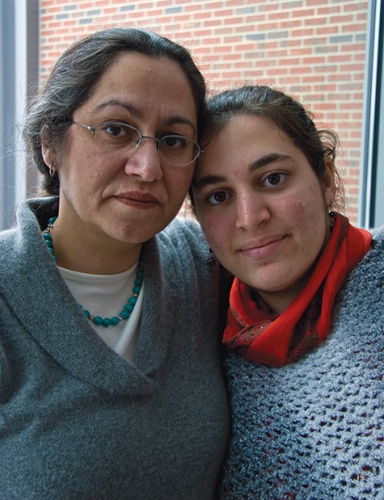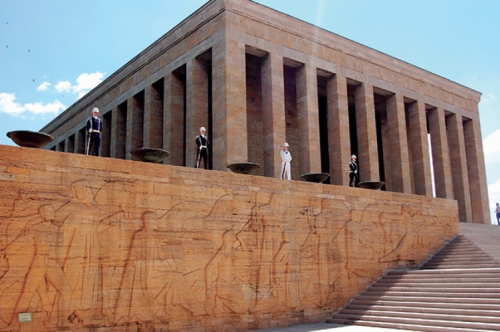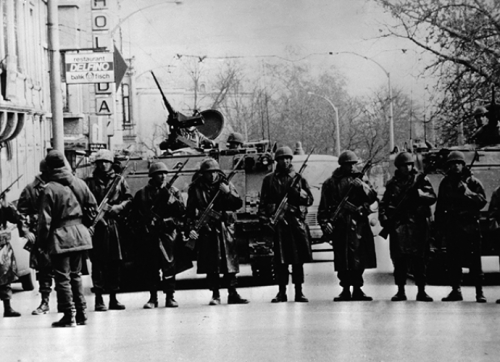On the night of September 14, 1980, Cangüzel Güner was at home in Ankara, Turkey when she heard a pounding at the door. Three men had come to arrest her father. His crime: being a member of the Turkish parliament during a military coup.
“It was pitch black and here were these soldiers taking my father into the darkness,” Cangüzel says. The family heard no word of his whereabouts for two months.
Twenty-eight years later, Cangüzel’s daughter Yekta was in Turkey with nine other Carolina students for a seven-week Burch Field Seminar with UNC history professor Sarah Shields. The students spoke to Turks of all stripes from large cities and tiny hamlets, trying to learn what makes Turkey tick. Is the country of the East or of the West, and in which direction will it turn now? They also spent hours in discussions with Shields, an expert on Turkish and Ottoman history. The students had incredible experiences, but while they were in Turkey rumors swirled of another military coup.
Yekta, for one, was particularly troubled. She started researching the 1980 coup and its origins. When she returned to Chapel Hill, she sat down with her mother, who is the associate director of the Carolina Center for the Study of the Middle East and Muslim Civilizations. The two of them talked for hours about how and why Cangüzel’s father was arrested and what this had meant for his family. This oral history, combined with Yekta’s formal research, helped her write a unique research paper about why coups occur in Turkey and how they damage the lives of innocent people.
Turkey is unusual. It’s not really Middle Eastern, despite its location. But it’s not wholly part of Europe, despite the government’s desire to join the European Union. The country is 99 percent Muslim, and outranks every Middle Eastern nation except Yemen in prevalence of Islam. But until now, Turkey’s government has been vehemently secular. Today’s ruling party has an Islamist past and is trying to change decades of antireligious legislation, including laws that controlled all religious institutions and banned women from wearing headscarves in certain places such as government offices and universities. And Turkey is a democracy with a president and a parliamentary system, but it has weathered several coups, one of which came right after Cangüzel’s father joined the parliament.
In 1977, when Cangüzel was thirteen, her father, Agâh Oktay Güner, told his family that he wanted to get into politics. “We were strongly against the idea, but I kept my feelings inside,” Cangüzel told me. “Then I hugged him and closed my eyes. There I saw three gallows. And I knew; three politicians had been executed after the 1960 coup. I opened my eyes. I was crying and I said, ‘I wish you would not do this, but I’ll support you.’ I knew what he was thinking. Since he was four years old, when his sister died in his mother’s arms, my father wanted to become a politician to help the poor.”
When he got older and people came to him for help, Cangüzel says he found that only politicians had the power to help them.
But Yekta says that her grandfather, who represented the city of Konya, became part of a deadlocked parliament in which none of the parties could unite to form a majority government. They were helpless to quell the street violence between political factions, much to Güner’s chagrin; he had been pleading for nonviolent solutions. The military allowed the violence to escalate, and in some cases even instigated it.
In her research, Yekta found that Turkey’s parliamentary system had a major flaw that allowed the coup to take hold: politicians, not the people, elected the president back then. When President Korutürk’s term ended in the summer of 1980, the parliament failed to elect a successor even after one hundred rounds of voting. Some citizens begged the army to intervene, Yekta says. And then it did.
Yekta says that her grandfather was one of 122,600 people the army swept up. “Many were journalists, teachers, businessmen, lawyers, and politicians,” she says. “It didn’t matter which political party they belonged to.” Güner was in jail for two months before his family was allowed to visit.
Back home in Chapel Hill, Yekta documented her mother’s experience, scribbling down notes while in the car or at dinner.
“Not knowing what would happen really took a toll on us,” Cangüzel says. “I became melancholic. My younger sister became even quieter and gave herself completely to her studies. My youngest sister Sâmiha, who was eight, could not comprehend everything. Her hair started falling out, leaving spots the size of quarters.” When they were finally allowed to see their father, Sâmiha latched on to him and would not let go. He had to peel her off at the end of the fifteen-minute visit, leaving as his family wept.
Weeks after her father was arrested, Cangüzel was walking past a storefront when she heard a radio broadcasting the names of people who could be executed for “crimes against Turkey.” Her father was on the list.
The men who carried out the 1980 coup claimed to be preserving the legacy of Mustafa Kemal Atatürk, the founder of the republic and Turkey’s first president. Images and statues of Atatürk are ubiquitous throughout Turkey. Carolina students snapped photos of Atatürk posters plastered on café walls. Huge pictures of him hang high above airport check-in counters. And his mausoleum in Ankara looms large on the landscape.
Many Turks hold Atatürk in extremely high regard, Yekta says. And his ideology, Kemalism — rooted in strong Turkish nationalism — is something of a dogma among his most devout followers. But as with all ideologies, she says, Kemalism can be interpreted in different ways. An extreme, even inhumane version fueled the 1980 coup.
Yekta and Cangüzel agree that Atatürk was a great thinker and strategist who gave women the right to vote and focused on industrialization and education. But some Turks have used his name to stoke political division instead of to encourage unity.
The 1970s were incredibly divisive times, Cangüzel told her daughter. Anyone could be dubbed an enemy not only for what they said or wrote, but for their appearance.
“For men, a mustache kept a certain way determined whether you leaned right or left,” Cangüzel says. “For women, there were ways of wearing parkas in winter. Sometimes the colors you wore, the way you combed your hair, what newspapers you read — such things divided people and families terribly.”
After the coup, 650,000 people were arrested and nearly 1.7 million were put under investigation. Thousands lost their jobs and their citizenship. Fifty people were executed, and hundreds more were tortured to death. Some of these people desired violent revolution. The vast majority, Yekta found, did not. Her grandfather, for instance, was a moderate who one week prior to his arrest had brought together twenty European nations to take a joint stance against international terrorism. In a speech just before the coup, he said:
“This republic was established on a multiethnic, multicultural, multireligious, and multilingual society. And no matter how hard we try to establish a nation-state of a single group, this plurality is our heritage and our richness. Turk, Kurd, Laz, Greek, Armenian, Sunni, Alevi — we all come from the same heritage. Violence is no solution to our problems.”
How was such a man a threat to the state?
Yekta says that General Kenan Evren, who led the 1980 coup, thought that Turkey’s problems arose from the lack of a single ideology that everyone believed in. But Evren’s interpretation of Kemalism, Yekta argues, was not like the version borne of Atatürk’s rule. “In the 1930s, Kemalism was more open to freedom of speech and thought than it is now,” she says.
When her grandfather spoke of Turkish unity and pluralism, the army thought he was a threat to the one true ideology. Güner’s case, along with thousands of others, went to trial.
Cangüzel told Yekta that her grandmother and two family friends took her grandfather’s speeches and contrasted them — line by line — with what the prosecutor accused him of. His lawyer used these facts for the defense. Güner was found not guilty of treason and released from prison on November 26, 1981. But he was not the same man, Cangüzel says. And the family never recovered. Her parents divorced, and Cangüzel cannot speak of the coup’s aftermath without great sadness.
When Yekta was in Ankara in 2008, news broke that Turkey’s moderate government had uncovered a plot to overthrow the state. According to seized documents, a shadowy nationalist group called Ergenekon planned to create a groundswell of popular protest through rallies, followed by bombings and assassinations, culminating in an economic crisis and armed coup. Then, a right-wing secular dictatorship would be installed. All this because the new president wants Turkey to join the European Union and his party lifted the ban on headscarves, which some people consider too Islamic.
Two years ago, Turkey changed a law so that the people — not Parliament — vote directly for presidential candidates. This, Cangüzel and Yekta think, should help stop coup attempts. “Hopefully nothing like the 1980 coup will happen again,” Yekta says, “and democracy will truly be respected from now on.”
Yekta Zülfikar, a sophomore majoring in international studies, received an Undergraduate International Studies Fellowship from the Sonja Haynes Stone Center to take part in the Burch Field Seminar in Turkey. Her research has inspired her to pursue a profession in diplomacy. Cangüzel Zülfikar, an expert in Turkish and Ottoman history, is the associate director for the Carolina Center for the Study of the Middle East and Muslim Civilizations. She also teaches Turkish at UNC as part of the Languages Across the Curriculum program in the Center for European Studies.






